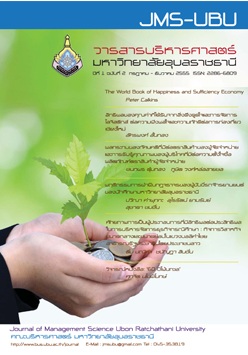The World Book of Happiness and Sufficiency Economy
Main Article Content
บทคัดย่อ
To identify the causes of happiness, we combine the six concepts of the King’s sufficiency economy with an extended 10-phase version of the renowned Maslow’s needs hierarchy. We apply the resulting matrix to textually analyze Leo Bormans’ (2011) World Book of Happiness. We find that the King’s sufficiency economy provides a closer “fit” to the secrets of happiness across cultures, genders, academic disciplines and geo-cultural and economic backgrounds than the Maslow hierarchy. The six concepts of the King’s sufficiency philosophy may therefore be used as both a working summary of the lessons from the World Book of Happiness and a general framework for future happiness research. In contrast, the elements believed to most effectively promote happiness are not the top needs cited by Maslow; and the extended Maslow pyramid does not even form a true hierarchy of happiness.
The analysis further shows that male and female authors from around the world fundamentally agree on what causes happiness; but that authors from different disciplines, geo-cultural groupings, and countries with different GDP/capita propose widely varying keys to happiness. An un-weighted reading of the 102 essays in the World Book of Happiness may therefore be misleading for Thailand.
Based on these findings, we recommend how both Thai individuals and planners in Thai governmental and non-governmental organizations can most appropriately increase happiness.
Downloads
Article Details
บทความที่ตีพิมพ์ในวารสารบริหารศาสตร์ มหาวิทยาลัยอุบลราชธานี เป็นลิขสิทธิ์ของวารสาร โดยเนื้อหาและความคิดเห็นในบทความเป็นความรับผิดชอบของผู้เขียนแต่ละท่าน ไม่เกี่ยวข้องกับคณะบริหารศาสตร์ มหาวิทยาลัยอุบลราชธานีแต่อย่างใด และหากมีข้อผิดพลาดประการใด ผู้เขียนจะเป็นผู้รับผิดชอบต่อบทความของตนเองแต่เพียงผู้เดียว

